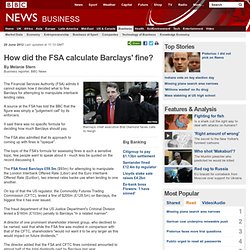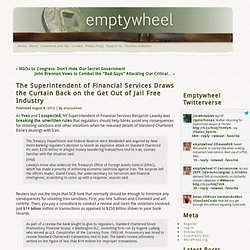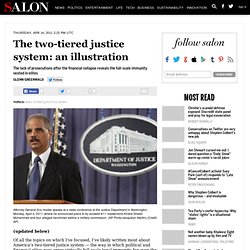

The 10 biggest Financial Services Authority fines. Government Lack Leverage Over Banks, Barofsky Says: Video. How did the FSA calculate Barclays' fine? 29 June 2012Last updated at 11:13 GMT By Melanie Stern Business reporter, BBC News Barclays chief executive Bob Diamond faces calls to resign The Financial Services Authority (FSA) admits it cannot explain how it decided what to fine Barclays for attempting to manipulate interbank lending rates.

A source at the FSA has told the BBC that the figure was simply a "judgement call" by its enforcers. It said there was no specific formula for deciding how much Barclays should pay. Whistleblower Lawsuits Against Banks Extinguished in Foreclosure Fraud Settlement. I think my disgust over federal housing policy is just about complete.

As you know, we’re still waiting for the actual terms of the foreclosure fraud settlement, more than one month after the announcement. But more information has dribbled out, not much of it to the good. Michael Hiltzik rounded up some of the more troubling issues. He mentions that OCC penalties will get folded into the settlement , basically charging $0 for their violations. The Federal Reserve did the same thing. But it gets worse. The suit claims Bank of America: Told borrowers and regulators that a complaint was “under review” while internally classifying the files as incomplete.
And there was another whistleblower case , unsealed last month documenting appraisal fraud at Countrywide , now part of BofA. Well, guess what. Durable change a long way off for UK’s scandal-ridden banking system. By Prem Sikka, University of Essex July 8th, 2012 The role of Barclays bank in manipulating the London Interbank Offered Rate (Libor) continues to dominate international financial media. The bank has already attracted fines from regulators in the UK and theUSA. But further revelations are likely as US Senate Committees are flexing their muscles, the UK parliament has launched an inquiry and the UK’s Serious Fraud Office (SFO) has announced a criminal investigation.
The temptation will be to look for scapegoats and prevent consideration of the systemic factors. The Superintendent of Financial Services Draws the Curtain Back on the Get Out of Jail Free Industry. As Yves and I suspected, NY Superintendent of Financial Services Benjamin Lawsky was breaking the unwritten rules that regulators should help banks avoid any consequences for violating sanctions and other violations when he released details of Standard Chartered Bank’s dealings with Iran.

The Treasury Department and Federal Reserve were blindsided and angered by New York’s banking regulator’s decision to launch an explosive attack on Standard Chartered Plc over $250 billion in alleged money laundering transactions tied to Iran, sources familiar with the situation said. [snip]Lawsky’s move also undercut the Treasury’s Office of Foreign Assets Control (OFAC), which has made a priority of enforcing economic sanctions against Iran.
The surprise left the office’s leader, David Cohen, the undersecretary for terrorism and financial intelligence, scrambling to come up with a response, sources said. Update: Barry Ritholtz’s take on this. FSA investigation into RBS ‘bad decisions’ a joke, right? December 3rd, 2010 (update 3) THE Financial Services Authority’s obsession with “light touch”, laissez-faire regulation in 1997-2008 did more than anything to transform London into the “Wild West” of finance. US investment banks dramatically built up their presences in the UK capital in the period: they knew they could rely on the FSA to turn a blind eye to fraud, insider trading, deceptive accounting, over-leverage and other misdemeanours that were unlikely to be tolerated back home. That’s why they called London the “Guantanamo Bay of finance“. Given the UK regulator’s shocking track record — see my earlier articles on Vavasseur/HBOS, Cameron Farley, HBOS Reading and building societies — (in at least three of these cases, there is clear evidence that the FSA colluded with ‘white collar’ criminals to cover up wrongdoing), I wasn’t surprised it has declared its inquiry into the Royal Bank of Scotland “closed”.
The two-tiered justice system: an illustration - Glenn Greenwald. Of all the topics on which I’ve focused, I’ve likely written most about America’s two-tiered justice system — the way in which political and financial elites now enjoy virtually full-scale legal immunity for even the most egregious lawbreaking, while ordinary Americans, especially the poor and racial and ethnic minorities, are subjected to exactly the opposite treatment: the world’s largest prison state and most merciless justice system.

That full-scale destruction of the rule of law is also the topic of my forthcoming book. But The New York Times this morning has a long article so perfectly illustrating what I mean by “two-tiered justice system” — and the way in which it obliterates the core covenant of the American Founding: equality before the law — that it’s impossible for me not to highlight it. The article’s headline tells most of the story: “In Financial Crisis, No Prosecutions of Top Figures.” And that, in turn, led to this, from The New York Times, June 3, 2009: Matt Taibbi: "Is the SEC Covering Up Wall Street Crimes?" (Democracy Now! Interview)